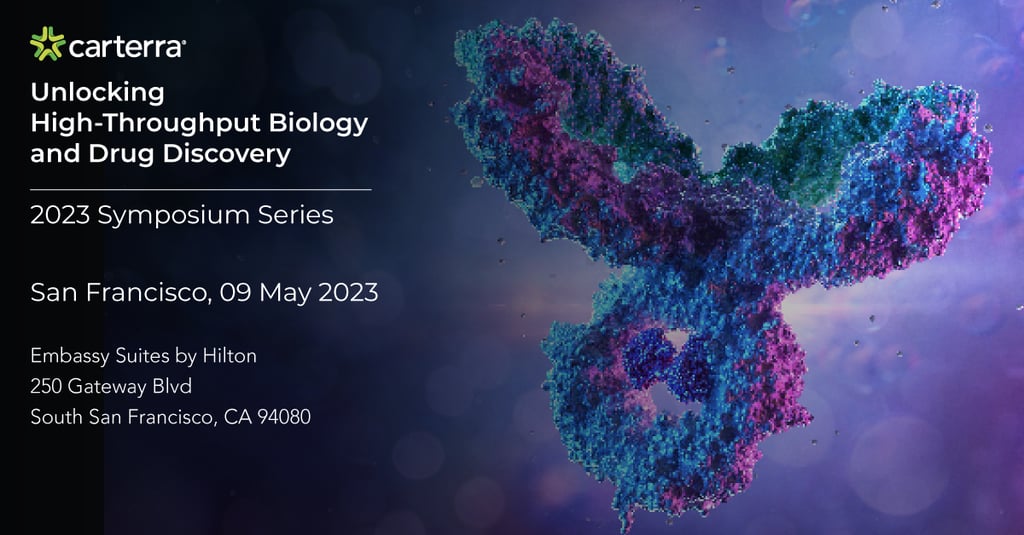
What You Will Learn
Please join Carterra at our upcoming symposium in San Francisco, CA. You will spend the day learning about high-throughput drug discovery and antibody therapeutics with some of the industry’s leading scientists. Our speakers will present new ways of looking at discovery, applications, and workflows, including HT-SPR. The topics you'll hear about include:
-
New methods in antibody discovery, DELs and PROTACs
-
Innovations using HT-SPR for drug discovery
-
Challenging assay formats, such as membrane targets and rapid binders
-
Strategies to streamline characterization workflows
-
Best practices in experimental design and analysis
Network with your peers. Lunch will be provided. Registration is required as seating is limited.
Register Here
Agenda |
|
|
8:45am – 9:00am |
Arrive and Check-in |
|
9:00am – 9:30am |
Networking and Coffee/Tea |
|
9:30am – 9:45am |
Symposium Begins—Welcome |
|
9:45am – 10:30am |
|
| Abstract: Engineered animals designed to produce human sequence antibodies can be evaluated and compared via antibody repertoire analysis at the nucleic acid level, however this approach does not capture antibody specificity profiles and “functional diversity” that may be present at the paratope level. We have generated over 20 different genetic configurations during the past decade, and have routinely evaluated the corresponding immune repertoires through the functional analysis of panels of antigen-specific mAbs using high throughput epitope binning and kinetics analysis. This type of characterization is also critical downstream, in workflows focused on hit expansion and antibody optimization that leverage deep phenotypic screening, NGS datasets, and structural modeling methods. | |
|
10:30am – 11:00pm |
|
|
|
Abstract: Selection of bi- and tri-specific binders often require the screening of large combinatorial sample sets derived from panels of single domain binders. The Carterra LSA platform makes analyzing the binding properties of these molecules straightforward and requires minimal amounts of mAb sample and antigen. The affinity of the binders to the targets can be measured in several assay formats and used to verify the independence and activity of each binding site for hundreds of clones. Along with the binding kinetics and specificity measurements, the LSA enables large scale epitope binning to ensure diverse sets of clones are being carried forward to functional evaluation. |
|
11:00am – 11:30am |
Break and Networking |
|
11:30pm – 12:00pm |
|
| Abstract: Therapeutic antibodies are an important tool in the arsenal against coronavirus infection. However, most antibodies developed early in the pandemic have lost most or all efficacy against newly emergent strains of SARS-CoV2, particularly those of the Omicron lineage. Here, we report the identification of a panel of vaccinee-derived antibodies that have broad-spectrum neutralization activity. Structural and biochemical characterization of the three broadest-spectrum antibodies reveal complementary footprints and differing requirements for avidity to overcome variant-associated mutations in their binding footprints. Together, these studies highlight the resilience and vulnerabilities of SARS-CoV-2 antibodies and provide road maps for further development of broad-spectrum therapeutics. | |
|
12:00pm – 1:00pm |
Lunch and Networking |
|
1:00pm – 1:30pm |
|
| Abstract: Antibody discovery efficiency and quality can be enhanced with machine learning. A lack of high-quality activity data at a scale sufficient to test and train models is a major limitation in the integration of machine learning and antibody discovery. We will present the use of high throughput Carterra LSA binding screens to test activity and accuracy of machine learning designed antibody libraries. In addition, we will present the use of high throughput Carterra LSA binding screens to train a machine learning model that predicts high-affinity antibodies for a target. | |
| 1:30pm – 2:00pm | 
Sam Zeng, PhD, Senior Research Scientist, OmniAb |
| Abstract: A subset of antibodies generated by cows feature ultralong CDRH3s with unique stalk/knob structures that are capable of binding deeply recessed or cryptic epitopes on target proteins that may be inaccessible to classical antibodies. Such antibodies not only can be expressed in the context of full antibodies or Fabs, but also in the form a 4-6kD “picobody.” These alternate forms can present challenges for characterization. Measuring the bona-fide, 1:1 binding affinity of naturally multivalent antibody-antigen interactions is facilitated by recombinant protein engineering and assay designs. The Ni-NTA surface enables captured kinetics assays with His-tagged antigens immobilized as ligands and recombinant antibodies as analytes while overcoming hurdles in surface regeneration. | |
|
2:00pm – 2:30pm |
Break and Networking |
|
2:30pm – 3:00pm |

Dalton Markrush, Scientist, Global Bioanalytics, Alloy Therapeutics |
| Abstract: In addition to having the desired interaction and mode of action on the target, therapeutic antibodies need to be highly specific. Non-polyspecificity is one of the most important characteristics to have for safety, efficacy, and ideal PK/PD. Since polyspecificity is difficult to get rid of by engineering, assessing it early in the antibody discovery process is crucial. In this study, we developed a new high-throughput SPR-based assay for polyspecificity screening. To validate the assay, we compared it to traditional assays such as ELISA or flow cytometry by using clinical stage antibodies. Where possible, results were correlated to clinical outcomes in literature. This assay is high-throughput and consumes very small amounts of sample, enabling polyspecificity de-risking at an early stage in the discovery process. | |
|
3:00pm – 3:30pm |
|
| Abstract: The LSAXT expands the capabilities of HT-SPR to meet the demands of challenging assay formats. By building on the established benefits of HT-SPR including more data in less time with less sample, LSAXT has the versatility to address a range of experimental workflows. This talk will highlight how LSAXT is a robust platform for characterization of drug candidates including PROTAC®s and kinase inhibitors. The benefits of enhanced sensitivity and overall data quality in LSAXT take HT-SPR to a whole new level. | |
|
3:30pm |
Symposium Ends |

 Dan Bedinger, PhD, Head, Application Sciences, Carterra
Dan Bedinger, PhD, Head, Application Sciences, Carterra

 Noah T. Ditto, Technical Product Manager, Carterra
Noah T. Ditto, Technical Product Manager, Carterra